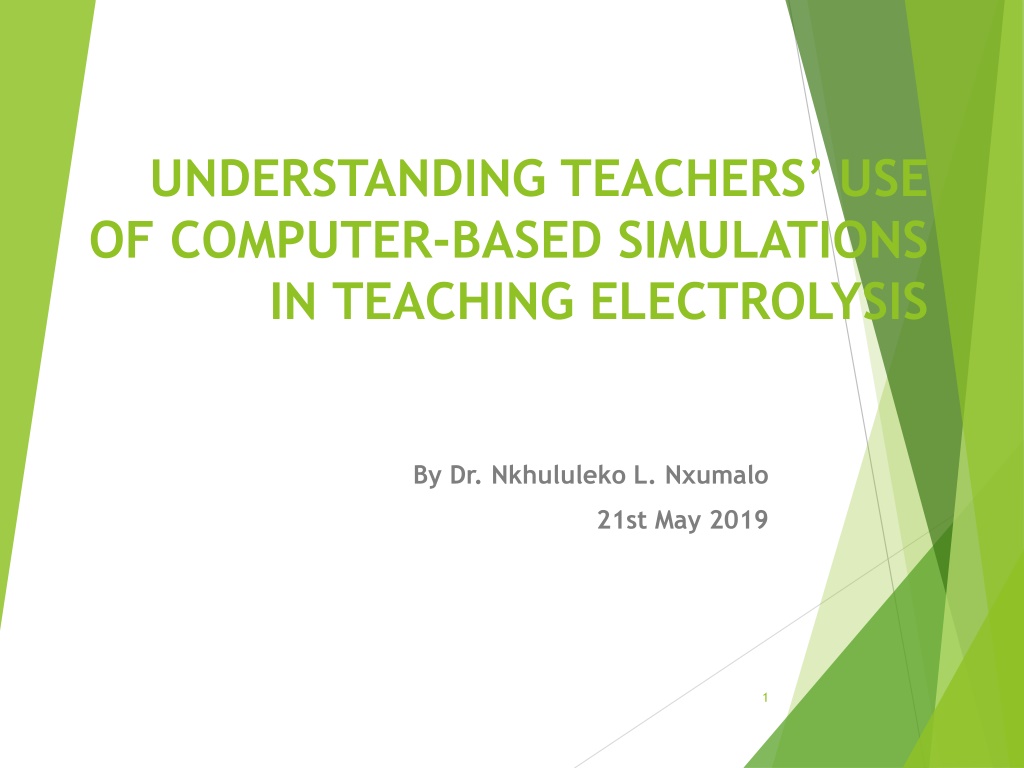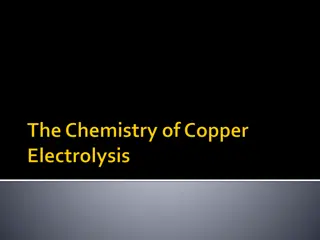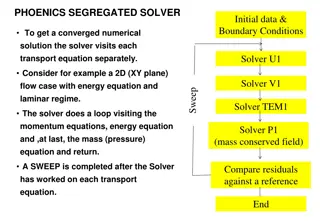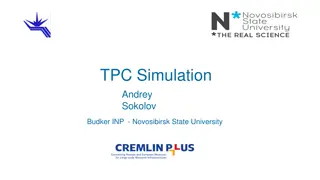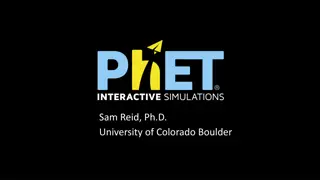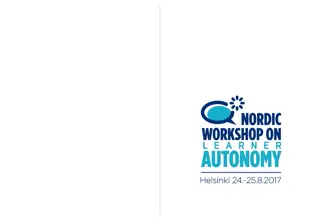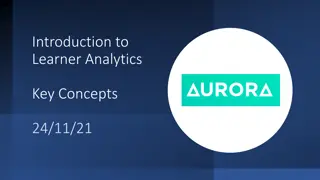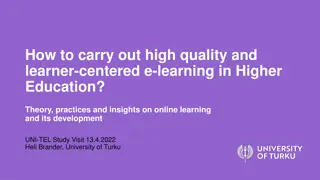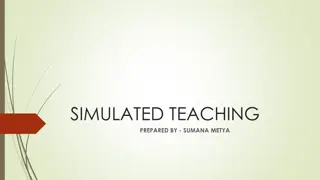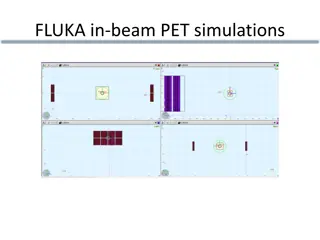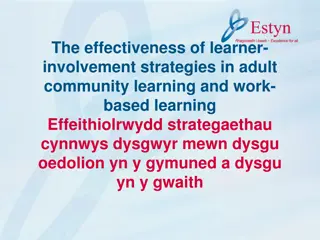Enhancing Learner Understanding through Computer-Based Simulations in Teaching Electrolysis
Computer-based simulations (CBS) have the potential to improve learner comprehension of complex science concepts like electrolysis. Challenges in teaching and learning electrolysis include identifying anode/cathode, analyzing reactions, and writing chemical equations. Factors contributing to these challenges include language barriers, rote learning, and teachers lacking subject knowledge. Utilizing CBS can aid learners in visualizing abstract phenomena and understanding sub-microscopic processes, ultimately enhancing their grasp on electrolysis concepts.
Download Presentation

Please find below an Image/Link to download the presentation.
The content on the website is provided AS IS for your information and personal use only. It may not be sold, licensed, or shared on other websites without obtaining consent from the author. Download presentation by click this link. If you encounter any issues during the download, it is possible that the publisher has removed the file from their server.
E N D
Presentation Transcript
UNDERSTANDING TEACHERS USE OF COMPUTER-BASED SIMULATIONS IN TEACHING ELECTROLYSIS By Dr. Nkhululeko L. Nxumalo 21st May 2019 1
Introduction Kaheru and Kriek (2010) define computer based simulations (CBS) as simple computer programs capable of displacing or representing concepts, ideas or representations A CBS is a program that is run on a computer to explore the approximate behaviour of the real system (Krain & Shadle, 2006) 2
Introduction cont CBS have the potential to enhance learners understanding of abstract concepts in science education (Jaakkola & Nurmi, 2008) Trey and Khan (2008) argue that CBS enhances learning by enabling learners to visualise unobservable phenomena and may aid learners understanding of the sub-microscopic processes in electrolysis 3
Introduction cont In Eswatini, electrolysis is one of the abstract topics in which learner understanding is very poor Electrolysis is a difficult topic for learners as well as for teachers (Rollnick & Mavhunga, 2014; Li Bong & Lee, 2016). 4
Factors that contribute to learners challenges Learners have a challenge in identifying the anode and the cathode, with analysing the reaction in the electrolysis of molten compounds and the aqueous solutions and writing chemical equations 5
Factors that contribute to learners challenges Language barrier Rote learning Teachers lack of subject matter Learners then opt to memorise when teachers cannot explain effectively ( Taner, Osman & Sami, 2012) 6
Factors that contribute to learners challenges It is expected that learners studying electrolysis must operate on three levels of thinking: the macroscopic, microscopic and the symbolic level (Mbajiorgu & Reid, 2006) However, Halim, Ali, Yahaya & Haruzuan (2013) and de Jong & Taber (2014) note that learners have a challenge in operating at these three chemical representations levels because they cannot see a connection between these levels 7
Problem statement It has been found that a large number of learners in eSwatini schools do not do science practicals because there is a shortage of science laboratories and equipment Even in schools that do have laboratories, most are not functional (Nxumalo, 2014) Nkemakolam, Chinelo and Jane, (2018) note that teachers do not do chemistry experiments because they claim that they can be hazardous 8
Problem statement Nkemakolam, Chinelo and Jane (2018) argue that not doing experiments lead to poor performance in chemistry In order to improve the performance of learners in Physical Science in eSwatini, different ways of learning rather than transmitting information need to be implemented 9
Research questions Primary research question How can teachers use of CBS in teaching electrolysis be understood? Secondary research questions What are teachers views on the use of CBS in teaching and learning electrolysis? How do teachers integrate CBS into teaching electrolysis? 10
Conceptual framework for research The way in which a teacher uses and integrates CBS into teaching can be regarded as a manifestation of his/her PCK 11
Conceptual framework for research 12
Methodology The study is located within the interpretive paradigm to understand teachers use of CBS in teaching electrolysis A qualitative case study research design was adopted. The sampling procedure was purposive and convenient and three experienced chemistry teachers (who had not previously used CBS) from three different schools that had computer laboratories were selected as participants 13
Methodology cont Teachers profile TEACHER GENDER TEACHER S QUALIFICTIONS CHEMISTRY TEACHING EXPERIENCE (Years) 24 LOCATION OF SCHOOL NUMBER OF LEARNERS A Male Bachelor Science and graduate Certificate Education (PGCE) B.Sc and PGCE of Manzini region in a semi-urban school 44 (B.Sc Post in B Female 15 Manzini region in a semi-urban school Hhohho region an urban area 53 C Female B.Sc. Education with 14 45 in 14
Methodology cont Three computer simulations were given to each participant to integrate into their teaching of electrolysis Trustworthiness was enhanced by employing several data collection strategies: the observation of three lessons per teacher while teaching electrolysis; an analysis of lesson plans; as well as questionnaires and interviews before and after using CBS. 15
Methodology cont They were observed how they introduced their lessons How they integrated the CBS in their lessons If they referred learners to the CBS 16
Methodology cont One of the CBS demonstrated the change of mass and the migration of electrons and ions The other CBS was on electrolysis of acidified water The third CBS was on the electrolysis of brine Content analysis was used to analyse data 17
Results Six themes emerged from the data Advantages of CBS Learners difficulties in learning electrolysis Challenges in using CBS Teaching strategies Teachers curricular knowledge Teachers attitudes 18
Discussion of results First sub-question was: What are teachers views on the use of CBS in teaching and learning electrolysis? All three teachers believed that CBS enhances learning by enabling learners to visualise the sub microscopic processes, such as the movement of ions and electrons. They also believed that using CBS captures learners interest and therefore enhance the understanding of the topic 19
Discussion of results cont All the teachers were concerned about shortage of equipment Teacher A and B were also concerned about the large of learners Teacher B and C also mentioned the socio- economic background as a challenge 20
Discussion of results cont Second sub-question: How do teachers integrate CBS into teaching electrolysis? Teacher B and C allowed the learners to work on their own and manipulate the CBS because they understood that CBS should be used with a learner-centred approach 21
Discussion of results cont Both teacher B and C mentioned that the active involvement of learners in manipulating the CBS was crucial for learning Teacher B and C utilised the CBS in each of the lesson observations, facilitating the various groups in class. Both conducted classroom discussions after the CBS, asking learners what they had observed. 22
Discussion of results cont Contrarily, teacher A used only one of the three CBSs that were provided. He did involve learners in a practical experiment, thereby engaging them with the macroscopic reality However, he used the CBS after they had completed the experiment, but only during the first lesson and used it in isolation, that is, without referring to it during the lesson. He believed that seeing the movement of ions during the first lesson would be sufficient to understand the process in the other applications of electrolysis. 23
Discussion of results cont Teacher A indicated that he would prefer a big screen with speakers, so that learners could see and hear, which indicates that he did not understand that manipulating the CBS enhances the understanding of sub- microscopic processes While Teacher B and C believed that CBS improved learners understanding and the teacher was expected to lead discussing after learners had manipulated with them to reinforce learning 24
Discussion of results cont The main question was: How can teachers use of CBS in teaching electrolysis be understood? Teacher A did not consider CBS as a method of teaching which should lead to learners manipulating or being hands-on with the topic Teacher B and Teacher C had an understanding that using CBS required learners to manipulate the simulated apparatus in the CBS 25
Conclusion It can be concluded that CBS should not be regarded as a panacea to overcome the challenges in teaching electrolysis, or to teach science altogether The results indicate that a lack of pedagogical knowledge of the appropriate use of CBS may lead to its ineffective use, as pointed out previously by Rutten et al. (2012). 26
Conclusion cont To be used appropriately, learners have to manipulate the CBS, and teachers have to allow learners to work on their own but guide them by asking relevant questions in the form of discussions or questioning teaching methods Teachers lack of content knowledge can seriously impede potential learning offered by CBS 27
Conclusion cont In particular, the teachers lack of content knowledge obstructed the opportunity to help learners make sense of the chemical reactions shown in the CBS However, CBS may also help teachers to realise their own inadequate knowledge and it thus has long-term benefits. The teachers attitudes towards CBS acted as amplifiers and filters for their use of CBS 28
Conclusion cont Teachers in the various departments in schools work in isolation Thus, the computers in these schools are underutilised There is a need for schools to review their policies so as to allow teachers in the respective departments to have access to the computers to support learning in all subjects 29
Conclusion cont The results of this study concur with existing literature in that CBS enhance learners understanding of abstract concepts such as electrolysis (Kotoka & Kriek, 2014; Kindgren & Schwartz, 2009) This study also shows that teachers PCK and SMK also has a great effect on whether CBS may or may not enhance learners understanding 30
Conclusion cont Teachers beliefs and use of CBS is very important in making CBS an effective teaching method Teachers have to be oriented on the appropriate use of CBS so that CBS may be of great benefit to both teachers and learners The results concur with Sarabando, Cravino and Soares (2014) who noted that learners gain depends on teachers pedagogy when using CBS when compared to when using experiments 31
Recommendations from study There is need for introducing CBS in all schools It is recommended that teachers be informed through educational workshops regarding the value of using CBS in their teaching so that they can embrace it Also, it is recommended that the policies in schools be reviewed so as to maximise the accessibility of computers 32
Recommendations from study cont.. It is also recommended that teachers be informed that CBS cannot replace any of the teaching methods that they normally use, but rather these have to be combined with CBS It is also recommended that teachers be guided on how much time they should spend using CBS in each topic so as to avoid losing track of time while using CBS 33
Thank you 34
